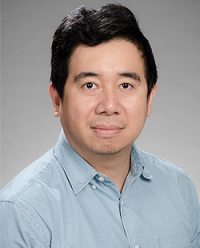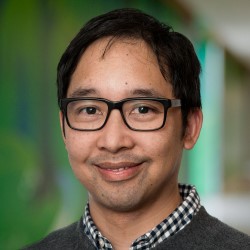In Seattle, we are very fortunate to have a dream team of mitochondrial disease experts. Over the years we have grown from one mito specialist to a large team of some of the world’s leading experts in mitochondrial diagnosis, treatment and research. Below is information on several of the Mito specialists that the guild supports.
Dr. Russell Saneto, DO, PhD
“We’re fighting to improve treatments for children with mitochondrial diseases to give them a better quality of life and help families be families again.”
Dr. Russell Saneto leads the Program for Mitochondrial Medicine and Metabolism at Seattle Children’s Hospital, where he is an attending physician in Neurology. He is also a Professor of Neurology at the University of Washington School of Medicine, and an Adjunct Professor of Pediatrics. He graduated with a medical degree from Des Moines University, School of Osteopathic Medicine and Health Sciences in 1994, then did his pediatric residency, pediatric neurology fellowship and pediatric epilepsy fellowship at the Cleveland Clinic.
Dr. Saneto became interested in mitochondrial disease during his fellowship at the Cleveland Clinic as his mentor, Dr. Bruce Cohen, was interested in this disorder. He is actively involved in the Mitochondrial Clinical Network and Mitochondrial Medicine Society, having previously served in the roles of President, Secretary and Treasurer with the latter. Learn more about his research and patient care expertise here.
Dr. Philip Morgan, MD
“My dream in moving to Seattle was to help form a strong group of physicians and researchers for the study of mitochondrial disorders and their treatment. Working with the Mitochondrial Research Guild has gotten us the tools necessary to greatly improve care for mitochondrial patients. These changes have begun to spread outside of Seattle and help ensure a permanent improvement in their care.”
Phil Morgan, MD, is a principal investigator in the Morgan Laboratory at Seattle Children’s Research Institute. He is also a professor in the Department of Anesthesiology and Pain Medicine at the University of Washington and Seattle Children’s Hospital. He joined Seattle Children’s in 2008 after working more than 20 years at Case Western Reserve University, where he and Margaret Sedensky, MD, became recognized as leaders in understanding anesthetic interactions in mitochondrial disease.
He received an MD from the University of Colorado School of Medicine and he completed a residency and fellowship in anesthesiology at the University Hospitals of Cleveland, and a fellowship in pediatric anesthesiology at the University of Washington. Read more about his research and patient care expertise here.
Dr. Margaret Sedensky, MD
“I think the possibilities for improving the care of patients with mitochondrial disease are huge. No one understands day to day care of these patients better than their families, which is why the input of the Guild is so important to us. It really will take a concerted effort on the part of all of us to make my personal hopes a reality.”
Margaret Sedensky, MD, is a principal investigator at Seattle Children’s Research Institute and a professor in the Department of Anesthesiology and Pain Medicine at the University of Washington. She joined Seattle Children’s in 2008 after working more than 20 years at University Hospitals of Cleveland, Case Western Reserve University School of Medicine. She and Phil Morgan, MD, are recognized as leaders in understanding anesthetic interactions in mitochondrial disease. She received an MD from the University of Colorado School of Medicine and completed residencies at University Hospitals of Cleveland and a research fellowship in anesthesiology at the University of Washington. Read more about her research and patient care expertise here.
Dr. Anna Scott, PhD, FACMG
“I hope development of more clinical testing will support the cycle of disease discovery and invention of therapies for patients and families affected by mitochondrial diseases.”
Dr. Scott leads the clinical Biochemical Genetics Laboratory at Seattle Children’s Hospital. She is also a Clinical Assistant Professor in the Department of Laboratory Medicine and Pathology at the University of Washington School of Medicine. Dr. Scott received her PhD in biochemistry and molecular biology at the University of California, Davis and did a postdoctoral fellowship in clinical biochemical genetics at Stanford University. Dr. Scott’s interest in mitochondrial diseases started with a functional enzyme testing and a curiosity about the relationships between structure and function. The clinical biochemical genetics laboratory at Seattle Children’s has a history of offering a wide assortment of enzyme assays to support clinical diagnoses. Expanding the test menu to include more mitochondrial proteins was a great opportunity for growth and further expertise development. Read more about her research and patient care expertise here.
Dr. Sirisak Chanprasert, MD
Dr. Sirisak Chanprasert joined the University of Washington School of Medicine in January 2017 as an assistant professor in the Division of Medical Genetics.
Dr. Chanprasert’s clinical interests are in the areas of metabolic and mitochondrial diseases. His area of focus for research and practice is the transition of care from children to adulthood in individuals with mitochondrial disorders. He is certified by the American Board of Internal Medicine, Clinical Genetics, and the American Board of Medical Subspecialty, Medical Biochemical Genetics. There have been only five physicians in the US since 1982 who are tripled boarded in internal medicine, clinical genetics, and medical biochemical genetics.
Dr. Chanprasert went to medical school at Faculty of Medicine Siriraj Hospital Mahidol University in Bangkok, Thailand. He did internal medicine residency at Bassett Medical Center in Cooperstown, NY. After NY, Sirisak moved to Houston to do medical genetics and medical biochemical genetics at Baylor College of Medicine from June 2014 to July 2015. In addition, he did an Academic and Research Fellowship in mitochondrial medicine at Seattle Children’s Hospital and Seattle Children’s Research Institute from July 2015 to June 2016. Sirisak’s mentors are Drs. Saneto, Morgan, and Sedensky and he is looking forward to partnering with both of them as well as Dr. Saneto.
Dr. Vincent Hsieh, MD
“Having the opportunity to take care of children with mitochondrial disease has been profoundly rewarding. I remain committed to developing a deeper understanding and providing the most nuanced and highly personalized care possible.”
Dr. Vincent Hsieh is an Associate Professor in the Department of Anesthesiology and Pain Medicine at the University of Washington and the Director of the Pediatric Anesthesiology Fellowship at Seattle Children’s Hospital. Dr. Hsieh received a MD from the University of Pittsburgh School of Medicine before completing an anesthesiology residency and pediatric anesthesiology fellowship at Stanford University and the University of Washington, respectively.
Since 2010 Dr. Hsieh has worked extensively with Drs. Morgan and Saneto in the clinical care of patients undergoing procedures at Seattle Children’s Hospital and has consulted on patients with mitochondrial disease at outside hospitals in the region and beyond. He has helped develop guidelines for the perioperative care of patients with mitochondrial disease, and is dedicated to expanding the understanding of optimal anesthetic care for this important patient population.
“Dreams are today’s answers to tomorrow’s questions.”
—Edgar Cayce

 “We’re fighting to improve treatments for children with mitochondrial diseases to give them a better quality of life and help families be families again.”
“We’re fighting to improve treatments for children with mitochondrial diseases to give them a better quality of life and help families be families again.” “My dream in moving to Seattle was to help form a strong group of physicians and researchers for the study of mitochondrial disorders and their treatment. Working with the Mitochondrial Research Guild has gotten us the tools necessary to greatly improve care for mitochondrial patients. These changes have begun to spread outside of Seattle and help ensure a permanent improvement in their care.”
“My dream in moving to Seattle was to help form a strong group of physicians and researchers for the study of mitochondrial disorders and their treatment. Working with the Mitochondrial Research Guild has gotten us the tools necessary to greatly improve care for mitochondrial patients. These changes have begun to spread outside of Seattle and help ensure a permanent improvement in their care.” “I think the possibilities for improving the care of patients with mitochondrial disease are huge. No one understands day to day care of these patients better than their families, which is why the input of the Guild is so important to us. It really will take a concerted effort on the part of all of us to make my personal hopes a reality.”
“I think the possibilities for improving the care of patients with mitochondrial disease are huge. No one understands day to day care of these patients better than their families, which is why the input of the Guild is so important to us. It really will take a concerted effort on the part of all of us to make my personal hopes a reality.”
